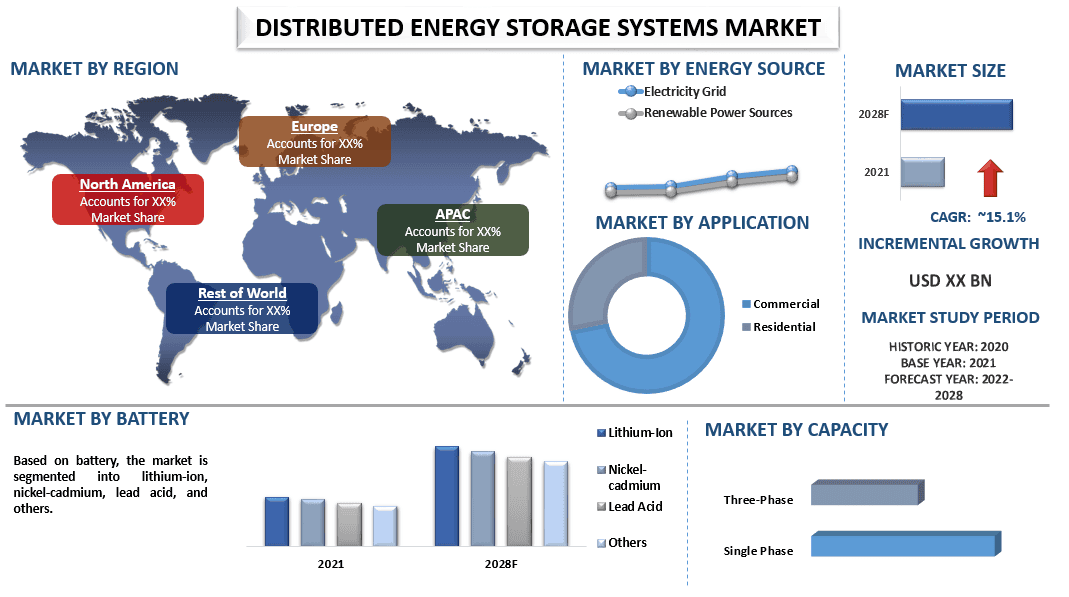The Distributed Energy Storage System Market is basically a packaged solution which stores energy for use at a future time. The two main components of the system are the DC-charged batteries and bi-directional inverter.
Key features of DES
- Peak shaving
- Voltage regulation
- Load shifting
- Renewable integration
- Back-up power
Top trends to Watch
- The storage capacity of battery energy storage is growing fast
A Chinese company BYD Co. is building a vehicle-battery factory next year in an effort by the electric-car maker in order to increase capacity and helps to revive earnings growth.
- Technology of Choice for Solar-based ESS
For the solar panels, lithium- ion battery powered energy storehouse is the crucial technology of choice moment. The growth of the EV request has contributed to greatly perfecting li- ion technologies in recent times.
Access sample report (including graphs, charts, and figures): https://univdatos.com/reports/distributed-energy-storage-systems-market?popup=report-enquiry
- ESaaS is a Key Service Model
ESaaS is principally a combination of an advanced energy storehouse system, an energy operation system, and a service contract which can deliver value to a business by furnishing dependable power more economically.
- Levelized Cost of Storage (LCOS) is an emerging metric
Levelized Cost of Storage (LCOS) is measuring the efficiency of ESS in the grid which handles 80-90% of renewable energy after adding the storage.
- Opportunities for Financing Battery Storage on a Project Basis is Increasing
The improvements in the business model and metrics for revenue/cost of advanced storage systems, are giving a renewed focus on project financing for ESS deals.
- The battery energy storage system is using artificial intelligence in order to lower down energy bills and provide utility grid services
Artificial intelligence is also playing a key role in energy distributed storage systems. It is providing various ways and methods to lower energy bills and improving the services
The future of energy storage distributed systems
The governments and companies pledge to become carbon neutral in the coming years; hence we will need more and more wind and solar power but we will also need to store that energy so it can be used as the need arises.
In the coming decades, we will generate more of our electricity from wind power and zero-carbon solar energy sources and we’ll store that electricity near the source, near the communities and industries that use it and everywhere in between. The clean energy will power the industries, homes, cars, and aircraft etc, which means we’ll need more renewable storage capacity and production.
Adoption of the distributed energy systems will increase by 40% by 2030
As per the Electricity Network Transformation Roadmap (ENTR), more than 40% of energy customers will use DER by 2027 and by 2050, that figure will grow to more than 60%.
Click here to view the Report Description & TOC: https://univdatos.com/reports/distributed-energy-storage-systems-market
The report also states that the distributed energy systems will provide significant economic, social, and environmental benefits including lower cost grid balancing, reduced greenhouse gas emissions and affordable extension of grids to unconnected communities. As more and more building owners think about their future energy goals and future-proofing their buildings, DES is providing a means of reducing operational costs and ensuring long-term energy security
Conclusion
Energy storage is a potential substitute for, or complement to, almost every aspect of a power system, including generation, transmission, and demand flexibility. Industries and commercial business are adopting the energy storage distribution systems. This helps in in decarbonizing our energy infrastructure and combating climate change. DES is providing a means of reducing operational costs and ensuring long-term energy security.
Contact Us:
UnivDatos
Contact Number – +1 978 733 0253
Email – contact@univdatos.com
Website – www.univdatos.com
Linkedin- https://www.linkedin.com/company/univ-datos-market-insight/mycompany/












Leave a Reply